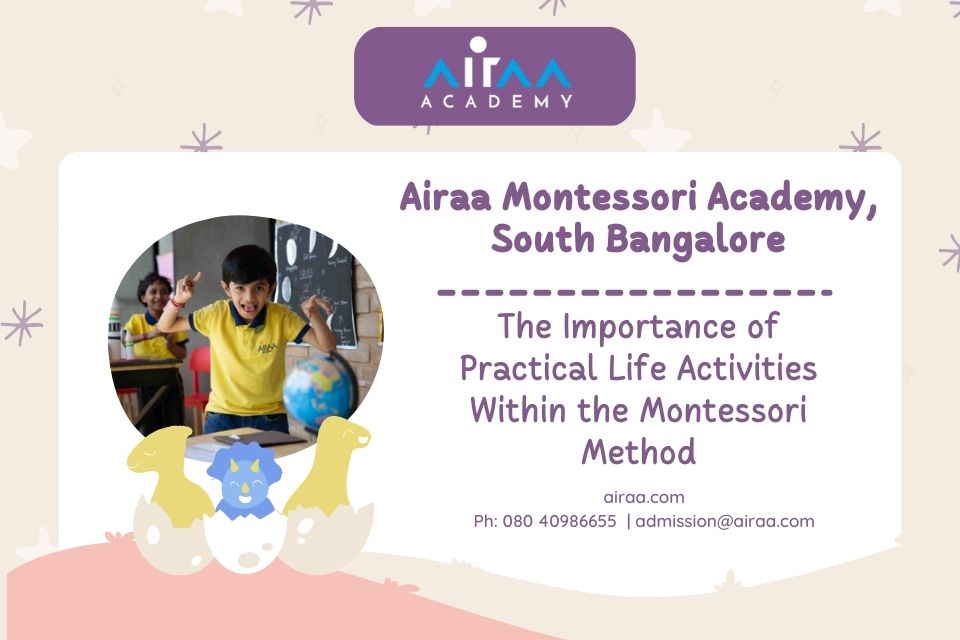Maria Montessori observed that learners are happiest when they are involved in real-world, everyday activities. They like doing housework like sweeping the floors, watering the plants, or washing down the tables. These tasks turned out to be so crucial to a learner’s growth that Montessori built a section of the Montessori classroom specifically for them, which she named Practical Life.
Looking for the best Montessori school in South Bangalore?
Airaa Montessori Academy is one of the top Montessori schools in South Bangalore. In order to foster excellence in academic learning, Airaa Montessori school, Bangalore provides learners with a high-quality education based on the Montessori method, which is firmly entrenched in the spirit and philosophy of Dr. Maria Montessori. In a Montessori atmosphere, learners between the ages of three and six learn to respect each other’s workspace and become physically independent. If you’re looking for the best elementary Montessori school in South Bangalore, you’ve come to the correct place.
The Montessori method’s ability to fully capitalize on a young learner’s willingness to learn is one of its defining characteristics. These regular routines and practices have a scope and order thanks to the Montessori practical life curriculum. Additionally, the Montessori method offers a pedagogy that elevates and empowers the learner in her/his pursuit of these talents, just like the other, more academic areas in the Montessori classroom. Practical life in Montessori is intentional play that fosters motor control, coordination, independence, focus, and a sense of accountability.
What are some examples of practical life activities?
Practical life activities are appropriate for all ages, including infants, and vary according to what the learner is capable of doing at each stage of development. Activities in elementary and middle school can range from as simple as pulling pants up or washing hands to as complex as baking a dessert or developing a business plan.
Why is it necessary to engage in practical life activities?
The skills learned while doing practical life activities at a young age allow learners to independently follow a complex motor sequence in order to fulfil his or her own desires and needs. These skills enable the learner to believe in themselves and develop the self-discipline required for success throughout their lives. Thus, the practical life Montessori curriculum teaches the learner what they need to learn in a way that is complementary to other academic disciplines, developing the same key fundamental executive and emotional skills. We being the best Montessori in South Bangalore make sure that learners engage in practical life activities to the fullest.
What is Practical Life in Airaa Montessori School? Top Montessori school in Bangalore
A Montessori classroom’s Practical Life addresses four major areas of development:
Preliminary activities:
These activities lay the groundwork and set the tone for all work in the Montessori classroom. These include tasks such as rolling and unrolling a mat, walking around a mat, sharpening a pencil, putting down a chair, and walking on the line.
Care of Self:
These activities give learners the tools they need to develop their physical independence. These could include things like learning how to wash your hands, brush your teeth, pack a lunch, pack an overnight bag, and tie your shoes.
Care of the Environment:
In the Montessori classroom, it’s crucial to learn how to clean. Examples of these tasks could be how to arrange the table, wash the dishes and silverware, sweep the floor, dust the shelves, water the plants, and clean up spills.
Social Graces and Courtesies:
There are no bookshelves stocked with these activities. Instead, the Montessori facilitator teaches the proper handshake, thank you, and interruption etiquette as well as how to cough and sneeze.
“Any child who is self-sufficient, who can tie his shoes, dress or undress himself, reflects in his joy and sense of achievement the image of human dignity, which is derived from a sense of independence.” – Maria Montessori
Each action, like pouring water or shining shoes, serves a purpose and aids in the development of fine motor skills and the capacity for sustained attention during a multi-step process. The learner is naturally inspired to be independent not only for himself but also for and with the community as a result of these important activities, which also instill in them a feeling of responsibility.
Academic and personal success are related to practical life:
Executive functioning abilities, or the life skills that let us as adults to organize and carry out tasks, are actively fostered through practical life activities. Executive functioning skills are necessary for success in school and later in all facets of adult life. The following illustrates how practical life work relates to executive functioning abilities:
Emotional control:
For instance, once a youngster finishes his food, he gets to decide whether to wash his plate so that others can have a snack. By taking on the obligations that are provided by the environment, the learner is developing empathy for his peers.
Inhibition:
In a Montessori classroom, where there is typically just one of each item on the shelves, the capacity to manage one’s own thoughts and actions is continuously practiced. A learner must wait patiently for his peer to finish his assignment before putting it back on the shelf for another learner to choose.
Working memory:
When caring for the prepared environment in Practical Life, a learner exercises spatial awareness. For instance, if a plant is misplaced, the learner will take it upon himself to put it back and water it as necessary. Additionally, the supplies must be put back where they belong on the shelf.
Initiation:
A learner in a Montessori classroom receives input from the carefully planned environment, which aids in the initiation of activities. The dishes need to be cleaned if the sink is overflowing with dirty ones. For example, before lunch and after a snack, the tables must be cleaned and the hands must be washed.
Prioritization:
Each Practical Life activity has a specific order that the learner must follow in order to finish it. When washing dishes, a learner must first turn on the water, apply dish soap, rinse the plate, and then pat it dry before putting it back on the drying rack.
Adaptability:
A learner must exercise patience and adaptation when deciding with his classmates which items to work on during the day, just like with all the other resources in a Montessori classroom.
Organization:
Montessori classroom is carefully planned out according to the learner’s stage of development. Because outer order inspires interior order, each shelf is thoughtfully planned from left to right and methodically positioned toward the front. Based on the responsibility the learner feels for the environment, this organizational sense is also developed in Practical Life.
Self-monitoring:
The youngster receives positive feedback from the materials in Practical Life. A youngster can perceive that the floor needs to be swept, that the laces on his shoes need to be tied, or that a plant needs to be watered if it is dry. This enables the learner to evaluate his performance in concrete terms.
Practical Life – A Foundation of Growth: Best Elementary Montessori School in South Bangalore
The driving force to be independent is one of the key factors in young learner’s growth. We frequently hear people say, “I can handle this on my own.” This attitude of self-sufficiency is strengthened by these exercises from real life. Learners learn that they can exert control over their environment, but that this control comes with some obligations. How happy they are when they have learned a skill that is beneficial. As individuals develop the ability to take on increasingly difficult activities, they feel privileged because they believe it shows appreciation for their intelligence and skill.
Airaa Academy, the best Montessori school in South Bangalore, India, offers the best Montessori education and the best learning environment. We are Bangalore’s top Montessori school.






